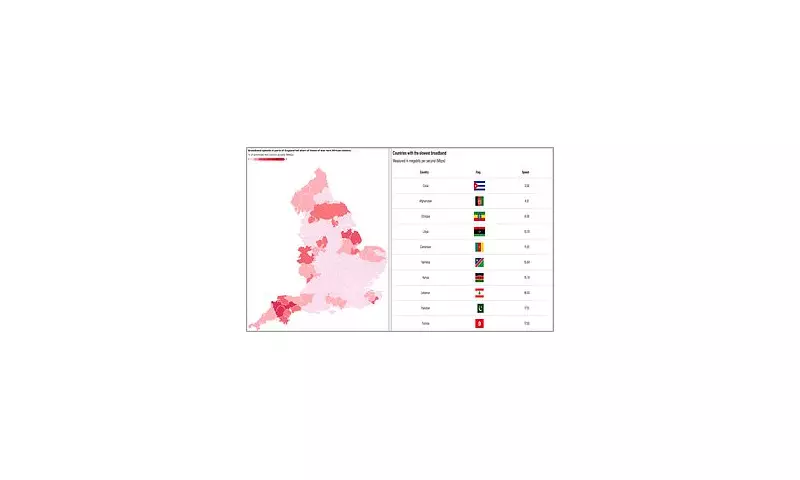
More than 130,000 households across England are struggling with internet speeds that fall below standards seen in conflict-ridden Libya and developing African nations, according to a damning Daily Mail analysis.
England's Digital Divide Exposed
The investigation reveals that approximately 9% of homes in West Devon relying on fixed-line connections cannot physically achieve the legal minimum download speed of 10mbps. This speed threshold, established under the Universal Service Obligation introduced in 2020, is considered the baseline for streaming television programmes, conducting video calls, and browsing picture-heavy websites simultaneously.
Shockingly, recent data from industry-recognised analyser Speedtest shows that last month's average download speeds in Libya reached 10.7mbps, while Cameroon achieved 11.9mbps and Namibia recorded 15.6mbps. War-torn Syria ranked bottom globally with just 3.4mbps, while Singapore led the world with blistering speeds of 400.68mbps.
The situation becomes even more concerning when examining the latest Ofcom figures, which show that 72,000 residential premises cannot even achieve 5mbps download speeds.
Britain's Broadband Blackspots Revealed
When analysing Ofcom's data by local authority, West Devon emerged as the worst-affected area, followed closely by Torridge where 8.5% of homes cannot access 10mbps speeds. Mid Devon recorded 6.2% of properties below the threshold, while both East and West Lindsey in Lincolnshire showed 4% of homes struggling with inadequate connectivity.
At the opposite end of the spectrum, 39 councils reported no premises falling below the USO standard, highlighting the stark regional disparities in digital infrastructure.
Drilling down to neighbourhood level through Middle Super Output Areas (MSOAs) – geographical areas containing around 10,000 people – the analysis identified Lympne and Palmarsh in Folkestone and Hythe as the country's worst-connected community. There, 47 out of 51 households (92.2%) on fixed-line internet cannot receive 10mbps download speeds.
Historical Roots of Britain's Connectivity Crisis
Experts trace much of England's ongoing broadband woes back to a planning decision made during Margaret Thatcher's government in 1992. Throughout the 1980s, BT had been actively rolling out fibre optic technology across the country in an ambitious programme known as the 'local loop'.
However, in 1991, Whitehall officials decided that American and Japanese companies should have opportunities to participate in building the national network, consequently halting BT's fibre rollout. Many believe that Britain's broadband capabilities have never fully recovered from this pivotal decision.
Ernest Doku, broadband expert at price comparison website USwitch, explained: 'Despite the progress being made in the full-fibre roll-out, some can't access fast broadband speeds because full-fibre has yet to reach everyone. The connections in some rural and remote communities still rely on older copper wires, which were never designed for today's internet demands.'
He added that 'laying fibre in these areas is often logistically difficult and expensive, meaning they are the last to benefit from the roll-out.'
Under the current Universal Service Obligation, consumers have the legal right to request a 'decent' broadband connection provided the necessary installation work doesn't exceed £3,400. The standard defines decent broadband as offering 10mbps download speed and 1mbps upload speed.
Price comparison experts MoneySuperMarket.com recommend that households with multiple internet users should ideally have speeds between 30-60mbps for optimal performance. Meanwhile, internet service aggregator ThinkBroadband reports that up to 85.5% of England now has gigabit availability – considered the gold standard and 100 times faster than the USO requirement.
An Ofcom spokesperson responded: 'We don't recognise these figures. Our data shows that more than 99% of UK premises can receive decent broadband as defined by the Universal Service Obligation. We expect the number of remaining properties to continue to fall, and other options such as satellite broadband may be available where there's not yet a fixed connection.'




